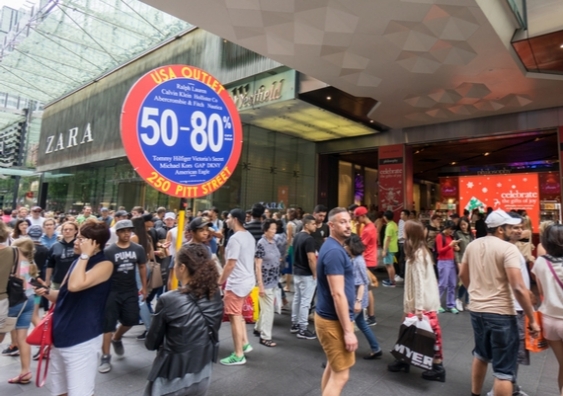Black Friday & Cyber Monday long weekend: Are you ready for the four-day ‘spendathon’?
Flash sales have pitted retailers against each other and irreversibly changed Australian consumer behaviour, says UNSW Business School lecturer, Veronica Jiang.
Flash sales have pitted retailers against each other and irreversibly changed Australian consumer behaviour, says UNSW Business School lecturer, Veronica Jiang.

The National Retail Association announced yesterday Australian consumers are expected to inject $1.3 billion online over the four day period starting with Black Friday through to Cyber Monday.
More specifically, an average spend of $54,357 per minute has been projected on online sales alone as from the end of November and throughout December.
Black Friday typically kicks off the holiday shopping season and has risen in popularity with more retailers and consumers participating in the annual flash sale event in Australia.

Veronica Jiang Lecturer, School of Marketing, UNSW Business School
“Retailers often push out many offerings and discounts during the holiday season to incentivise consumers to spend more,” Veronica Jiang, Lecturer at the School of Marketing, UNSW Business school said.
Forced into direct competition with international marketplaces, local retailers are pressured to meet customers’ expectations and provide great discounts to secure customer loyalty.
In response, the increase in the number of retailers offering a digital offering has accelerated the popularity of Black Friday sales – with customers enjoying a wider availability of products.
How have the Black Friday sales impacted the way customers shop?
Black Friday sales have changed consumers’ shopping habits in the lead-up to Christmas. Savvy customers can now strategically plan their Christmas shopping around the Black Friday/Cyber Monday weekend and move their Christmas shopping to a month earlier.
The prevalence of the holiday shopping season in Australia has also reduced consumers’ willingness to pay full price.
“Consumers tend to stock up during the holiday season and decrease their purchases in the new year. That is why January and February are slow months for retailers,” Veronica said.
Why are consumers more prone to impulsive buying during sales periods?
During the holiday shopping season, retailers capitalise on consumers’ higher likelihood to impulse buy, for example, a 24-hour window to get a 30% discount. Research conducted by PwC indicated that “rational decision-making abilities are at their weakest on Black Friday”.
“Discounts available for only a short period of time encourage consumers to make more impulsive purchases, and they also instil the fear of missing out – thereby prompting customers to buy more,” Veronica added.
There is also a strong correlation between impulse buying and the demographic background of the consumer.
“Millennials – young consumers in their 20s and 30s tend to be more impulsive buyers. However, this is in stark contrast with Generation Z – those who are born after 1995. Generation Z tend to be more cautious with their spending habits because they have witnessed how millennials carry a huge burden of debt due to frivolous spending habits.”
According to Veronica, flash sales are also successful due to the ‘shopping momentum effect’. For example, as more consumers buy into the idea of Black Friday, they want confirmation that they are saving more money. This behaviour is often translated into more purchases.
“Once a consumer buys a product during the holiday shopping season; this drastically lowers the decision bar and shortens their decision-making process – ultimately prompting them to buy a second or third item.”
What is the customer sentiment around Black Friday sales?
Many online retailers have started Black Friday sales a week ahead of physical stores – proactively reaching out to consumers via email marketing techniques and social media platforms.
In many cases, Black Friday sales have created a competitive environment due to the scarcity of products made available. Retailers have demonstrated this by commonly advertising items as ‘limited edition’ to raise their perceived value and trigger the need for purchase.
“This can, however, create negative emotions as consumers feel frustrated if they miss out on limited deals. However, this frustration can keep consumers more switched on for more deals in the future, up to the point where their goals are fulfilled.”